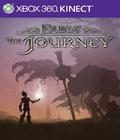Few games at E3 2011 have had a more unevenly received unveiling than Fable: The Journey, Lionhead's newest entry into the Fable franchise. The game makes exclusive use of the Kinect to control the game, both in body movements as well as in voice recognition, and pits you as the driver of a horse cart trying to safely bring a mysterious woman across the lands of Albion. The game's presentation at the Microsoft pre-E3 press conference seemed too linear, leaving many to wonder if Fable: The Journey was going to be "on rails."
We got to sit down with Peter Molyneux, ask him some questions about the game and check out a deeper presentation of the demo. Though we only got to watch as a person demoing it and not take the reins ourselves, the demo did show an extensive segment of controlling the horse while on the cart, and we also saw some combat segments both from the cart and while on foot. Magic is your primary and only weapon to fight off enemies, but the system can be used in a variety of ways.
By performing different gestures with your hands, an amount of energy appears on-screen that you must gather to power your magic abilities. Once you have gathered it, you can use other gestures to fling it as a fireball, shape it into an ethereal throwing spear, or use both hands to power up a big blast. Other uses that were mentioned but not shown were ethereal tools such as hammers, which can be used to repair your equipment, and fishing poles, which can be used to grab a bite to eat. To the observer, the magic system seems intuitive and engaging, and the Kinect seemed to do a good job of processing relatively complex gestures and series of actions.
It has been said that there is no melee combat in the game, and Molyneux justifiably reasoned that it caused such a disconnect for the player. In real life, when you swing a sword, you expect feedback when it hits and to feel it in your wrists and arms, whereas with the Kinect, even a successful blow fails to give you that real-life resonance. Thus, a magic-based system skirts the issue entirely, and since flinging magic is by nature a non-contact sport, it hopefully avoids such a disconnect.
Controlling the horse while on the cart is easily done by using both arms, grabbing the reins and pulling them to guide the horse in the direction you wish to go. Whipping the reins increases the horse's speed whereas pulling back on both of them slows down the horse. More importantly is how using subtle motions of the above will result in slighter turns or more gentle speed changes, giving you finer control of the horse cart. As you perform any action, you can elect to say a command, which can be anything from "hard left" as you really pull on the left reins to "balls bollocks." Either way, your horse will begin to learn that phrase means that corresponding action, and ultimately, you can use your voice for some or all horse commands.
 As the presentation progressed, the direction was clearly quite guided and linear on a set path, detailing the driving mechanics and the combat mechanics in a few, later scenarios. Molyneux insisted that while the presentation was preset to show off the key facets of the game in a controlled environment, the game was not going to be linear. For those who understood the point, he actually asked them to sign a whiteboard if they agreed to not deem the game as merely on the rails. Whether or not the game is on rails is not verifiable since it is still under development, but at the very least, the picture we snapped will be a good yardstick when the game releases and we can see for ourselves.
As the presentation progressed, the direction was clearly quite guided and linear on a set path, detailing the driving mechanics and the combat mechanics in a few, later scenarios. Molyneux insisted that while the presentation was preset to show off the key facets of the game in a controlled environment, the game was not going to be linear. For those who understood the point, he actually asked them to sign a whiteboard if they agreed to not deem the game as merely on the rails. Whether or not the game is on rails is not verifiable since it is still under development, but at the very least, the picture we snapped will be a good yardstick when the game releases and we can see for ourselves.
At the end of the interview, it was clear that Fable: The Journey could be pretty fun, assuming that the magic system has enough depth to carry the game's combat and that it truly isn't a linear experience. Fable games aren't known for being shallow, so here's hoping that this one keeps the pace in that regard. Though no official release date was given, Microsoft is hoping to see it out of the gate sometime in 2012, with Molyneux holding more of a "We'll see" stance. We'll have more information on Fable: The Journey once it's a bit further down its development path.
Greg Hale also contributed to this preview.
More articles about Fable: The Journey













 Fable: The Journey, powered by the latest Unreal Engine 3 tech, is poised to take the action-adventure series to new dimensions by fully using the Kinect technology.
Fable: The Journey, powered by the latest Unreal Engine 3 tech, is poised to take the action-adventure series to new dimensions by fully using the Kinect technology.




